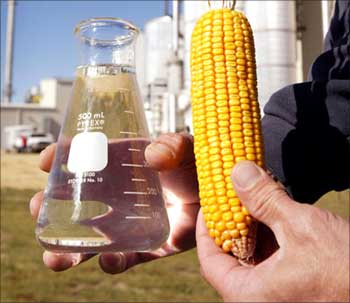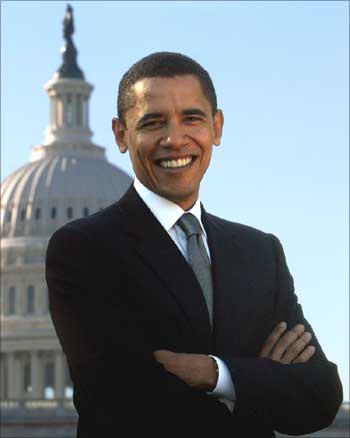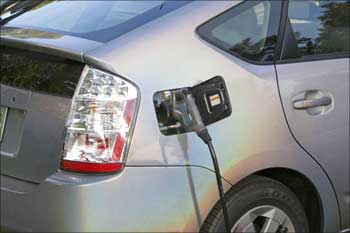
Vinod Khosla, the iconic billionaire has once again demonstrated why he is the undisputed 'venture capitalist with the Midas touch'. When it comes to clean technology, no one can rival Khosla's ability to raise money even in depressed market conditions.
Recently, two of Khosla Ventures' new funds -- Khosla Ventures III and Khosla Ventures Seed -- raised $1.1 billion, which is actually more money than they had targetted originally. The money will be used to foster innovation in areas, including clean energy technology.
In an exclusive interview with Aziz Haniffa, Editor, India Abroad, Khosla acknowledged that he was 'a little bit surprised' at people's interest to invest in green and high-risk experiments even in a down market, and said that it was indeed a very good sign.
The Pune-born Khosla, 54, formed his own firm, Khosla Ventures, in 2004. He co-founded Sun Microsystems in 1980 after graduating from Stanford University, along with his college-mates Scott McNealy, Andy Bechtolsheim, and University of California Berkeley alumnus Bill Joy.
After leaving Sun in 1985, he joined the venture firm of Kleiner Perkins Caufield & Byers in 1986 and was associated with several major ventures, including Juniper Networks.
Khosla is also one of the founders of The Indus Entrepreneurs and ck12.org that aims to develop open source textbooks and lower the cost of education in America and elsewhere.
Besides Stanford from where he received his MBA, he is an alumnus of the Indian Institute of Technology, Delhi, from where he received his bachelor in technology in electrical engineering and Carnegie Mellon University, from where he received his masters in biomedical engineering. Read on. . .

You have continued with messianic zeal over the past few years and have been unrelenting in your quest for green technologies. What has been the driving force?
I believe it is a large problem and whenever there is a large problem it sort of becomes a large opportunity. That combination is really what's been driving me.
Your company recently raised over $1 billion to spur development of renewable energy and other clean technologies. Were you pleasantly surprised that you were able to raise such a huge amount considering that there was a lull for green technology investment particularly in the wake of the global economic crisis?
Yes, I would say I was a little surprised at people's interest. There's clearly a lot of interest and that indeed is very good.
What new ventures are you planning to launch?
Obviously, we don't talk about them (in advance), but we will be looking at new ventures and keep reviewing them and see what comes up.
Is the focus going to be definitely on green technologies?
Absolutely. Though we have interests in other technologies, more than two-thirds would be clean (or green) technologies.

At the macro-level, how do you see the investment climate?
Our focus is very much long-term. We don't look at what the stock market is doing. Depending on the area, if you take a five or 10-year perspective as we do, obviously clean technology... and technology in general is a very promising area.
Are you still very gung-ho on ethanol?
I still believe we'll be using a lot of liquid fuel, yes.
You've consistently brought up the example of Brazil (fueling automobiles with sugar-cane extractions). But there are those critics who say that Brazil's case is insignificant when compared with the sheer number of automobiles and vehicles in the US and other developed economies. How do you rebut those critics?
I don't. They just don't know what they are talking about. You see, there is no need to imitate what Brazil is doing. There are alternate ways of extracting bio-fuels. There is a paper on my web site on where bio-mass comes from (www.khoslaventures.com).
So, I don't worry about these critics. People said mobile phones will never happen. Internet will never happen. People were also sceptical about personal computers in every home. These naysayers always say 'nay' and I don't worry about them too much.
What are your views on bio-fuels? Does it make sense given all the controversy that it is depleting some of the world's food resources?
That's a silly controversy. You shouldn't make them out of food. It's simple.

Since China and India are consuming large quantity of oil in order to sustain growth, where do you see the world's dependence on oil going in the next few years?
Oil consumption will keep going up and we'll need to find a substitute. Either we'll see $200 a barrel oil or we'll need a substitute. And I hope we find a substitute.
How optimistic are you that such a substitute will be available in, say, a decade or so?
Oh, I think we'll see a substitute much earlier. The technologies will become available in the next five years.
You were one of the early supporters of then Senator and now President Barack Obama, being one of the finance co-chairs of his presidential campaign and a major contributor yourself to the campaign. How do you think he is doing now seven months into his presidency?
I believe he's doing pretty well. I'm very happy with his focus, especially on environment.
Do you believe that with all he's gotten on his plate, he's committed to green technologies and climate change?
Absolutely.

What makes for that optimism? After all he's juggling around a whole lot of other domestic and foreign policy issues and his plate is overflowing?
I don't know what to tell you except that he keeps talking about it (green technologies and climate change). He's still focused on it.
Do you empathise with India's position that it cannot acquiesce to absolute caps on carbon emissions, particularly at this stage of its growth?
Yes, I do. And, I think that there are other things countries like India can do and should do like focusing on efficiencies. I believe, that India and the United States can work on more efficient methods without India having to have caps on carbon emissions.
India and China contend that the US and other developed countries contributed the most to climate change with their unfettered and unadulterated industrialisation and now want these emission caps on emerging powers to stifle growth. Your comment please.
Politics is not my area of expertise, and so, I don't want to get into it.
In terms of carbon emissions and climate change, what do you think a country like India should do?
How efficient your GDP is in carbon emissions is what is most important. And that's something that saves the country money in the long term.
Were you a strong proponent of the US-India civilian nuclear deal, and do you think nuclear energy can be a panacea to help alleviate India's acute energy needs?
Yes, I was a proponent of the deal, but I don't think nuclear energy is that important in the overall scheme of things. There are many different approaches that can be taken in India. So, it will end up being a mix of different approaches - it has to be a basket of approaches and there will not be one thing.
Indian government is keen to increase the number of IITs (Indian Institutes of Technology), as they feel there is a dearth of proper higher education in the country. What is your take on this?
I don't know. I am not intimately familiar with the situation in India, and so, I don't want to comment so much. My focus is on technologies here in the US.

Some reports have cited you as saying that electric cars are irrelevant. Why do you feel that way?
I didn't say electric cars are irrelevant. I said they are too expensive.
Is your argument that why would people in developing countries buy a Toyota Prius for $25,000 when they could probably get a Tata Nano for $2,500?
Absolutely. Who will pay 10 times more for a car.
So, where do you see electric cars going? Do you think they've got to make huge adjustments if they want to capture markets like India and China?
First of all, batteries have to change. They are too heavy and too costly to be practical.
To come back to the Obama Administration. . . you went to bat for Ro Khanna, who's gotten a top job in the Commerce Department. How do you feel about several young, dynamic and talented Indian Americans being appointed to senior positions?
I am glad to see it happening and Indians getting more representation in politics and government... that's really a good thing.